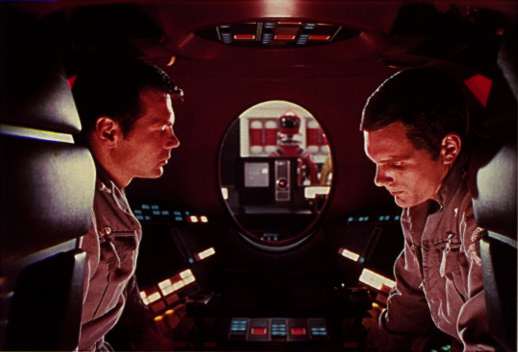| HAL 9000 - A Fictional Computer |
| Written by Lucy Black | ||||||
Page 2 of 2
Could HAL be built?With hindsight is obvious to anyone with any knowledge of computers that HAL could not possibly have been born in 1997. Back then we were struggling to get neural networks to do trivial things and they didn't really do well enough to be taken seriously. Now the estimated time of arrival of such a powerful artificial intellect depends on your optimism and, of course, your involvement with AI (Artificial Intelligence). HAL had it all, artificial vision, speech recognition, speech generation and, most important of all, understanding. He even manages to lip read to discover what the astronauts are plotting - an incredibly difficult perceptual task without additional cues, even for a human.
HAL even lip reads
Around the time of HAL’s virtual birthday in 1997 there was much debate exploring just how far away we were (and still are) from the creation of HAL, most of it biased toward reinforcing a delusion that HAL could be built if only we had the determination; or at worst it could be built in a few years, again if we really put our minds to it. All we need to do, it was claimed is bring it all together in one place and we will have an operational HAL, presumably in Urbana. Nonsense, of course at the time but not so nonsensical now. We have moved on from the "engineering" approach to AI and into the learning phase.For example, HAL plays chess with the crew and it was pointed out that the chess program Deep Blue was already able to beat all but a few human players. This is correct but not really a valid point of comparison because HAL’s intelligence ranges over the full domain of human intelligence. He talks, he discusses poetry, he sees - he does not just input chess positions and output move co-ordinates. Deep Blue is impressive but not in the same universe as HAL. When you move the comparison on to Alpha Go and the huge neural networks that play all manner of games things are not so clear cut. Here we have systems that have learned to play and we are not so clear about how they do it. Yes we know that a neural network has manged to extract the regularities from the data but exactly what that means is far from obvious. We are reaching a point where the exact way that AI works isn't clear to us. In the first half of the 21st century HAL doesn't look so impossible. The failure to produce HAL yet shouldn’t be taken as an admission of defeat. It’s not as if 2001: A Space Odessey was a particularly good or well informed prediction of the future. In other areas of technology it was similarly too optimistic - there was no inter-lunar travel, let alone inter-planetary travel by 2001, and cold fusion is still part joke, part dream. The film also misses the degree of miniaturization that has indeed become possible within the time frame. There are no tablets or PDAs in the plot; the instrumentation on the space ship is decidedly old- fashioned; there is no Internet; no virtual reality and why are they only playing chess? HAL himself is huge and looks more like a mainframe with style. None of this is an important criticism, in that it detracts not one bit from the enjoyment of the film. Arthur C Clarke benefited from a spurious reputation that his science fiction was close to science fact. As the man who is reputed to have predicted, or even invented, the communications satellite, his word was taken seriously. This of course ignores all of the people who actually made this fairly obvious concept work. This is like crediting Jules Verne and H G Wells with the invention of the Apollo project, the Saturn V booster and the Space Shuttle simply on the strength of their futuristic fiction. If we need to give science fiction writers an importance it should be because of the quality of their fiction. If all this is true, and HAL is just another fictional computer with no real claim to be a valid prediction of the future, why single it out? There have been lots of other fictional computers such as Colossus, the huge computer that takes over the world in the film “The Forbin Project” or “MultiVac” Isaac Asimov’s huge computer that makes repeated appearances in his short stories. MultiVac even has the advantage that it isn’t actually malevolent. HAL's higher profile might be that it is attractive to the people who strive to create an artificial intelligence. Despite the simple and obvious fact that HAL kills four people he manages to do it in a very polite way. In short, he is a very likable homicidal manic.
<ASIN:B00004VVN8> <ASIN:B00002611E> <ASIN:0262193787> <ASIN:B0003JAOO0> |
||||||
| Last Updated ( Monday, 03 October 2022 ) |

